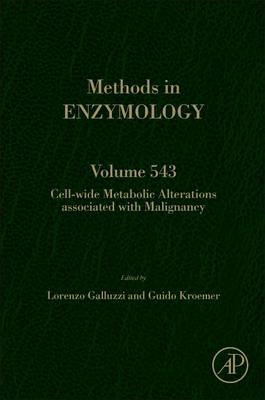
Cell-wide Metabolic Alterations Associated with Malignancy
Academic Press Inc (Verlag)
978-0-12-801329-8 (ISBN)
Lorenzo Galluzzi is Assistant Professor of Cell Biology in Radiation Oncology at the Department of Radiation Oncology of the Weill Cornell Medical College, Honorary Assistant Professor Adjunct with the Department of Dermatology of the Yale School of Medicine, Honorary Associate Professor with the Faculty of Medicine of the University of Paris, and Faculty Member with the Graduate School of Biomedical Sciences and Biotechnology of the University of Ferrara, the Graduate School of Pharmacological Sciences of the University of Padova, and the Graduate School of Network Oncology and Precision Medicine of the University of Rome “La Sapienza. Moreover, he is Associate Director of the European Academy for Tumor Immunology and Founding Member of the European Research Institute for Integrated Cellular Pathology. Galluzzi is best known for major experimental and conceptual contributions to the fields of cell death, autophagy, tumor metabolism and tumor immunology. He has published over 450 articles in international peer-reviewed journals and is the Editor-in-Chief of four journals: OncoImmunology (which he co-founded in 2011), International Review of Cell and Molecular Biology, Methods in Cell biology, and Molecular and Cellular Oncology (which he co-founded in 2013). Additionally, he serves as Founding Editor for Microbial Cell and Cell Stress, and Associate Editor for Cell Death and Disease, Pharmacological Research and iScience. Guido Kroemer got his M.D. in 1985 from the University of Innsbruck, Austria, and his Ph.D. in molecular biology in 1992 from the Autonomous University of Madrid, Spain. He is currently Professor at the Faculty of Medicine of the University of Paris Descartes/Paris V, Director of the INSERM research team ‘Apoptosis, Cancer and Immunity’, Director of the Metabolomics and Cell Biology platforms of the Gustave Roussy Cancer Campus, and Practitioner at the Hôpital Européen George Pompidou (Paris, France). He is also the Director of the Paris Alliance of Cancer Research Institutes (PACRI) and the Labex 'Immuno-Oncology'. Dr. Kroemer is best known for the discoveries that mitochondrial membrane permeabilization constitutes a decisive step in regulated cell death; that autophagy is a cytoprotective mechanism with lifespan-extending effects; and that anticancer therapies are successful only if they stimulate tumour-targeting immune responses. He is currently the most-cited cell biologist in Europe (relative to the period 2007-2013), and he has received the Descartes Prize of the European Union, the Carus Medal of the Leopoldina, the Dautrebande Prize of the Belgian Royal Academy of Medicine, the Léopold Griffuel Prize of the French Association for Cancer Research, the Mitjavile prize of the French National Academy of Medicine and a European Research Council Advanced Investigator Award.
1. Methods to measure cytoplasmic and mitochondrial Ca2+ concentration using Ca2+-sensitive dyes2. Methods to measure intracellular Ca2+ fluxes with Organelle-Targeted aequorin-based probes3. Methods to measure baseline Ca2+ levels with second-generation organelle-targeted fluorescent probes4. Methods to assess the autophagic flux in malignant cells5. Methods to assess autophagy in situ-transmission electron microscopy versus immunohistochemistry6. Methods to measure the enzymatic activity of PI3Ks7. Luciferase-based reporter to monitor the transcriptional activity of the SIRT3 promoter8. Metabolomic profiling of cultured cancer cells9. Pulsed stable isotope-resolved metabolomic studies of cancer cells10. Single-cell imaging for the study of oncometabolism 11. Study of cellular oncometabolism via multi-dimensional protein identification technology12. In vivo quantitative proteomics for the study of oncometabolism13. Metabolomic profiling of neoplastic lesions in mice14. Metabolomic profiling of tumor-bearing mice15. Metabolomic studies of patient material by high-resolution magic angle spinning nuclear magnetic resonance (HR-MAS NMR) spectroscopy16. Analysis of metabolomic profiling data acquired on GC–MS
| Erscheint lt. Verlag | 17.6.2014 |
|---|---|
| Reihe/Serie | Methods in Enzymology |
| Verlagsort | San Diego |
| Sprache | englisch |
| Maße | 152 x 229 mm |
| Gewicht | 840 g |
| Themenwelt | Studium ► 2. Studienabschnitt (Klinik) ► Humangenetik |
| ISBN-10 | 0-12-801329-X / 012801329X |
| ISBN-13 | 978-0-12-801329-8 / 9780128013298 |
| Zustand | Neuware |
| Haben Sie eine Frage zum Produkt? |
aus dem Bereich


